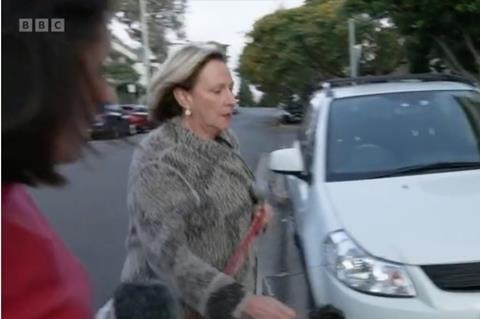A former Post Office general counsel has said the organisation's ‘aggressive’ approach to fighting litigation was borne of a desire for sub-postmasters to get to the truth of what happened.
In a witness statement provided to the Post Office Inquiry, Jane MacLeod said she regretted that her decisions prolonged resolution of issues and extended the distress of convicted sub-postmasters involved in group litigation. But she denied being part of any cover-up to refuse disclosure or deny claimants access to information about Horizon. She said there was no evidence that anyone within the Post Office was actively seeking to withhold evidence, nor that there was any conspiracy to do so.
MacLeod has attracted widespread criticism for her refusal to answer questions in person. She is based in Australia and the inquiry chair has said it would take too long to bring legal proceedings to force her to return to the UK. MacLeod was tracked down and door-stepped by a BBC reporter (pictured below) but refused to answer the journalist’s questions.
The inquiry and core participants will have to rely on the 211-page witness statement provided by MacLeod, who was general counsel from 2015 to 2019.

MacLeod said that throughout the course of the group litigation, she relied upon advice from counsel and external solicitors Bond Dickinson, who were in the office regularly and spoke daily with the Post Office. The firm was also responsible for drafting most legal documents during the course of the litigation. MacLeod said she did not comment on the factual accuracy of statements but rather looked at the ‘overall argument’ and whether the position and context were clear.
She had proposed the establishment of a steering group to oversee the litigation but where decisions were to be made by the group, a paper would usually be presented by Bond Dickinson, with updates provided by MacLeod to other members of the executive committee and to the government. She received no feedback from chief executive Paula Vennells that the board was unhappy with information or briefings being escalated.
MacLeod said the Post Office wanted to resolve issues with sub-postmasters in a way that would provide a ‘firm and repeatable basis’ for settling issues in the future. ‘Settlement prior to the common issues or Horizon trials would not resolve the key questions around Horizon for anyone who was not party to that settlement, and so POL decided to defend the claim in the courts,’ she said. ‘Clearly this strategy was premised on the advice received from the external legal team that POL had a reasonable prospect of successfully defending the claim.’
MacLeod stressed that reputational issues did not affect the litigation strategy or any of her decisions and that the Post Office ‘would not protect its reputation at all costs’.
She was not involved in the generic defence or counterclaim launched by the Post Office, although she was supportive, she said. An email from May 2016 showed that Vennells had asked MacLeod and her head of public relations to ‘put on your blackest hats and think through the worst outcomes’ of litigation. She told a colleague a year later that discussions on the group claim ‘took us down an unnecessary rabbit hole’.
MacLeod told the inquiry that the Post Office had been concerned that wide and non-specific requests for disclosure would result in a disproportionate number of irrelevant documents being provided with significant time and financial costs. She denied that Post Office or its advisers wanted to delay or withhold disclosure.
During the trial itself, she recalled that the Post Office was ‘concerned at the trend’ that Mr Justice Fraser was seeking to support the claimants wherever possible. She said the counsel team had first raised the prospect of bias and advised on an application for recusal. She then briefed the board before handing over to Lord Neuberger to outline his views.
‘In my opinion the directors present took the matter seriously and were very aware that an application to a judge to recuse himself for apparent bias was uncommon and must be considered very carefully,’ she added.






























